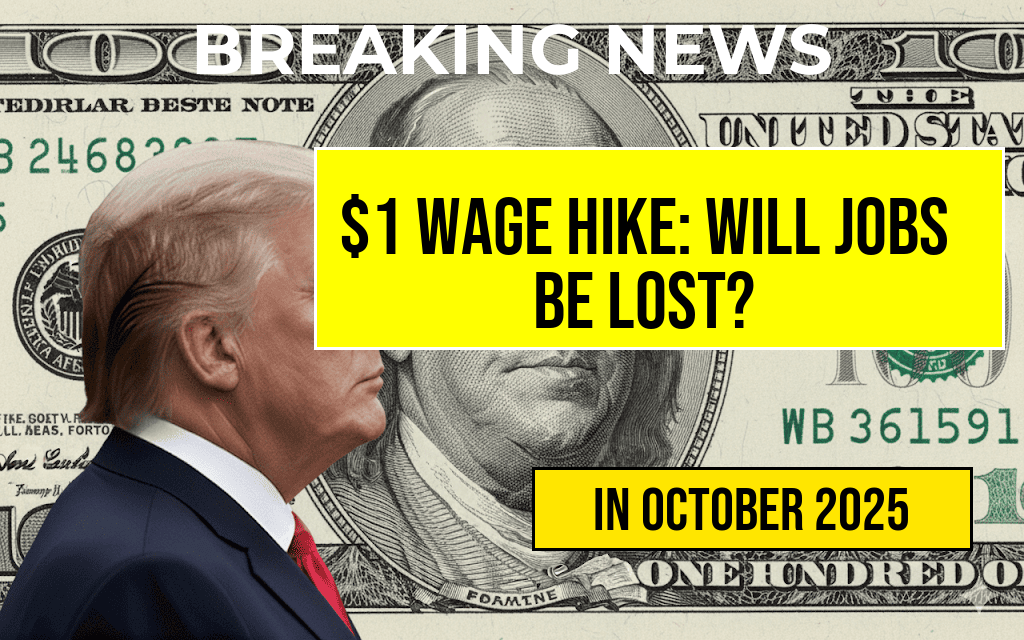The recent decision to increase the federal minimum wage by $1 has sparked intense debate about its potential impact on small businesses across the United States. Advocates argue that raising the wage helps workers meet rising living costs, while critics warn that it might compel small employers to reduce their workforce. With many small businesses already feeling the strain from inflation and supply chain disruptions, the question looms: will this wage hike lead to layoffs? Economists and business owners share their insights on the potential repercussions of this policy change.
Understanding the Minimum Wage Increase
The federal minimum wage has remained at $7.25 since 2009, making it one of the lowest in the developed world. The proposed $1 increase aims to provide relief to low-income workers and address growing concerns over economic inequality. Proponents believe that a higher wage can stimulate consumer spending, ultimately benefiting local economies.
Economic Implications for Small Businesses
Small businesses represent a significant portion of the U.S. economy, employing nearly half of the workforce. However, many of these entities operate on thin margins, making any additional labor costs potentially burdensome. The increased wage could lead to various responses from business owners:
- Adjusting Staffing Levels: Some small business owners may opt to lay off employees or reduce hours to offset increased payroll expenses.
- Raising Prices: Others might pass on the costs to consumers through higher prices, which could lead to decreased sales.
- Automation: Increased wages may accelerate the adoption of technology and automation, further reducing the need for human labor.
Real-World Examples and Case Studies
Several cities that have already implemented similar wage increases provide valuable insights into potential outcomes. For instance, Seattle’s minimum wage increase in 2014 led to mixed results. A study conducted by the University of Washington found that while wages rose, some low-wage workers experienced reduced hours or job losses as businesses adjusted to the higher costs. Conversely, other research indicated that overall employment levels remained stable.
| City | Year of Increase | Initial Impact | Long-term Effects |
|---|---|---|---|
| Seattle | 2014 | Wage increase led to reduced hours for some workers | Overall employment levels stabilized |
| San Francisco | 2014 | Job growth continued despite wage hikes | Increased worker retention and morale |
| Los Angeles | 2016 | Mixed impacts on employment in small sectors | Higher prices led to decreased consumer spending |
Expert Opinions on the Wage Increase
Economic experts have varied opinions on the implications of the wage increase. According to a report by the Forbes, small business owners are particularly concerned about the immediate financial impact. Many argue that the government should provide support to help businesses adapt, such as tax incentives or grants. Others suggest that a gradual increase, rather than a sudden jump, would allow businesses to adjust without resorting to layoffs.
Potential Solutions for Small Businesses
To mitigate the risks associated with the wage increase, small businesses can explore several strategies:
- Cost Management: Streamlining operations and identifying areas to reduce costs can help balance increased wage expenses.
- Employee Training: Investing in employee training can improve productivity, potentially offsetting the higher labor costs.
- Flexible Business Models: Adapting business models to focus on higher-margin products or services can help maintain profitability.
Conclusion
As the $1 wage increase looms, the landscape for small businesses may shift dramatically. The immediate effects are likely to vary widely based on industry, location, and individual business circumstances. While some may face layoffs or adjustments, others might adapt successfully and even thrive in the new wage environment. Stakeholders should keep a watchful eye on these developments, as they will shape the future of employment and economic growth in the United States.
Frequently Asked Questions
Will the $1 wage increase lead to layoffs in small businesses?
While some experts believe that a $1 wage increase may pressure small businesses financially, many also argue that it could lead to increased productivity and employee retention, ultimately offsetting potential layoffs.
How will the $1 wage increase affect small business profits?
The $1 wage increase could impact small business profits differently depending on the industry and location. Some businesses may experience higher labor costs, while others might see improved employee morale and reduced turnover.
Are there any studies on the effects of minimum wage increases on employment?
Yes, numerous studies have examined the effects of minimum wage increases on employment. Results vary, with some showing minimal impact on job loss, while others indicate potential layoffs in certain sectors.
What strategies can small businesses use to manage increased labor costs?
Small businesses can manage increased labor costs from the $1 wage increase by optimizing operational efficiency, adjusting pricing strategies, or exploring automation to reduce reliance on manual labor.
Is a $1 wage increase likely to be implemented nationwide?
While some regions may adopt a $1 wage increase, it is uncertain whether it will be implemented nationwide. Legislative changes and local economic conditions will play a significant role in this decision.

Leave a Reply